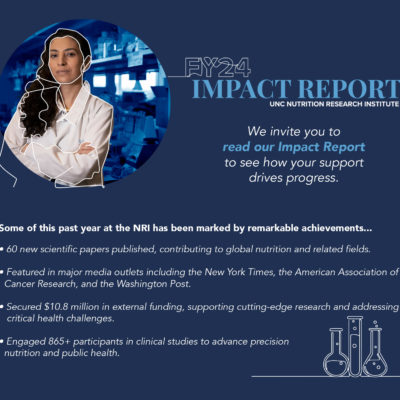Susan M. Smith, PhD
Dickson Foundation – Harris Teeter Distinguished Professor of Nutrition
susan_smith@unc.edu
704-250-5065
Dr. Smith’s laboratory studies the molecular mechanisms by which dietary components affect prenatal development. Current work largely focuses upon alcohol and how it causes Fetal Alcohol Spectrum Disorders (FASD). We are interested in how alcohol damages the embryo and fetus, and in the environmental and genetic factors that attenuate or heighten alcohol’s toxicity.
First described in 1968, FASD remains a leading known cause of neurodevelopmental impairment in the U.S. Our work examines the molecular mechanism by which alcohol causes the specific neurobehavioral and craniofacial dysmorphologies that typify FASD. Our research has identified much of the intracellular signaling pathway initiated by alcohol to trigger the apoptotic elimination of craniofacial precursors, a population known as the neural crest. This work currently focuses on alcohol’s ability to cause nucleolar stress, a sensor of cellular energy status and an activator of p53/MDM2-mediated cell cycle arrest and cell death.
More recently, our work has expanded to interrogate how alcohol disrupts nutrient metabolism and requirements of the maternal-fetal dyad. Using bioinformatic approaches, we performed simultaneous whole transcriptome analysis and untargeted metabolomics on the alcohol-exposed mouse mother and her fetuses. This has revealed that alcohol causes a microbial metabolite biosignature in mom and fetus that may have both neuroprotective and neuroinflammatory effects. It has also revealed how alcohol changes maternal metabolism and impairs her ability to supply essential nutrients that support her growing fetus. We are further characterizing the maternal microbiome under alcohol and how this may further affect maternal-fetal metabolism. We have also studied the long-term health impact of FASD and find that alcohol causes metabolic syndrome in the aged offspring; moreover, this glucose intolerance and obesity both correlate with worsened cognitive function as it ages.
Finally, we use precision nutrition approaches to identify nutrient-related gene polymorphisms that affect cognitive performance in those who are diagnosed with FASD. This work has uncovered a critical influence of the essential nutrient choline and its transporter SLC44A1 and highlights a mechanism by which supplemental choline may improve outcomes in alcohol-exposed pregnancies. This work is expanding to identify additional nutrient-related effect alleles using a GWAS approach. Finally, in work now concluded, we showed that alcohol creates a functional iron deficiency in both mother and fetus, and this causes both fetal anemia and brain iron deficiency; dietary iron intervention reverses these deficits and improves cerebellum-dependent learning.

Brendon Coats
Research Technician, Smith Lab
Brendon Coats is currently pursuing a BS in Biology at the University of North Carolina at Charlotte. He started at the NRI as an intern in January of 2022, and now is a Research Technician in the Smith Lab where is excited to gain experience in the research field. He hopes to enroll into graduate school and earn his masters after UNC Charlotte.

George Flentke, PhD
Research Scientist, Smith Lab
George Flentke received his Ph.D. in Biochemistry from the University of Wisconsin-Madison, where his dissertation focused on the structure and catalytic activity of the enzyme UDP-galactose-4-epimerase, which is crucial for galactose metabolism. His postdoctoral research in Biochemistry and Pharmacology at Tufts University / New England Medical School focused on the design of inhibitors of dipeptidyl peptidase enzymes, which control immune function and HIV infection. After returning to UW-Madison he continued working with the immunosupressives cyclosporine and rapamycin. He is an experienced enzymologist/protein chemist and synthetic organic chemist. Currently, he manages Dr. Smith’s lab, where he investigates the mechanism by which alcohol alters ribosomal signaling and mTOR activity in alcohol-exposed neural crest.

Yanping Huang, PhD
Postdoctoral Research Associate, Smith Lab
Yanping Huang is a Postdoctoral Research Associate in Dr. Susan Smith’s Lab. She is from China where she earned her PhD degree. In her free time, she enjoys cooking and running.

Thomas Wilkie
Research Technician, Smith and Saini Labs
Thomas is from Chattanooga, TN. He graduated in May 2022 from Grove City College with a BS in Biochemistry.
Discover the NRI’s Impact: FY24 Report
NRI Researchers Secure New NIH R01 Grants for Critical Nutrition Research
Four principal investigators at the UNC Nutrition Research Institute (NRI) have been awarded R01 grants from the National Institutes of Health (NIH). Each grant will fund key research projects designed to advance our understanding of the links between nutrition,...
NRI-Hosted Symposium on Future Directions in Choline
First established as an essential nutrient in 1998, choline is a nutrient with critical roles in the health and development of the brain, liver, and more. The past 25 years have seen significant advances in the choline field, however, the question remains: What’s...
NRI Postdoctoral Research Associate Promoted to Assistant Professor of Nutrition
The UNC Nutrition Research Institute is pleased to welcome Nipun Saini, PhD, to its faculty. Previously, Saini worked as a postdoctoral research associate in the Smith Lab. Saini worked in the Smith Lab for six years, helping the team advance in understanding the...
2023 Publications
2022 Publications
2021 Publications
2020 Publications





